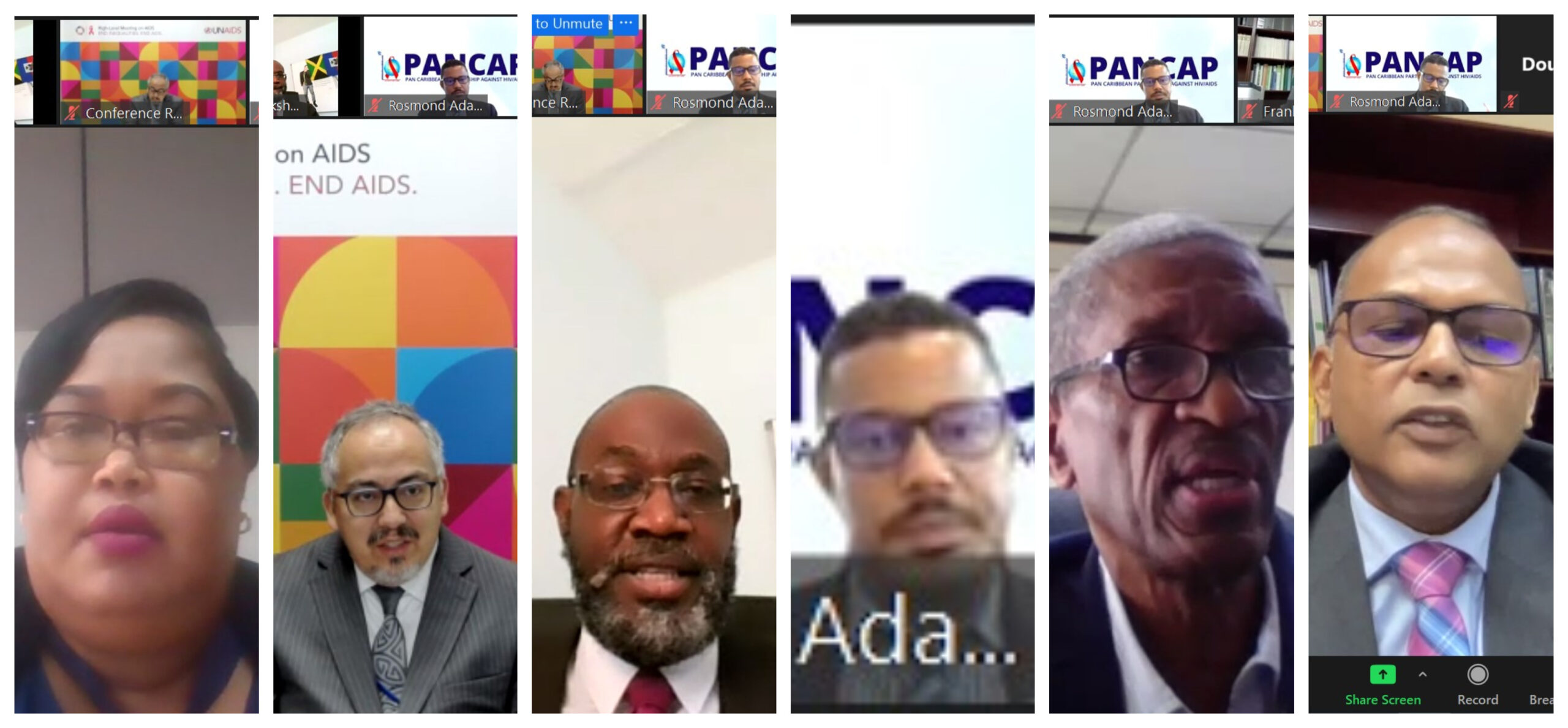
Caribbean stakeholders call for focus on key populations and community-led approaches to HIV and COVID-19
Caribbean partners from governments, civil society and the development community met on 7 June to discuss regional priorities for the 2021 United Nations High-Level Meeting on AIDS and its resulting political declaration. The virtual Caribbean Caucus was hosted by the Pan Caribbean Partnership against HIV and AIDS (PANCAP) and moderated by the Caribbean Community (CARICOM) Assistant Secretary-General, Dr Douglas Slater.
The PANCAP Director, Dr Rosmond Adams, noted that the Caribbean had made significant progress in key aspects of the HIV response. Eight countries and territories have been validated by the World Health Organization for eliminating vertical HIV and syphilis transmission. And between 2010 and 2020, AIDS-related deaths in the region fell by half (51%).
But to get on track to end AIDS by 2030, he said Caribbean countries must step up the pace around prevention, testing, treatment, care and ending stigma and discrimination. By 2020, 82% of people living with HIV in the region were diagnosed. Two thirds (67%) of all people living with HIV were on treatment, and 59% were virally suppressed.
While new HIV infections have fallen by 28% since 2010, the rate of decline is too slow. Overall, members of key population communities and their partners accounted for 60% of new HIV infections in 2020. Around one-third of new HIV infections were among young people aged 15–24 years.
Speaking on behalf of the Caribbean Regional Network of People Living with HIV (CRN+), Ms Diana Weekes noted that key structural barriers continue to block access to HIV prevention, treatment and care services. These include “stigma and discrimination … lack of privacy, breach of confidentiality and limited redress” when people’s rights have been violated. She noted that no country in the region had adopted the CARICOM Model Anti-discrimination legislation, which was developed almost a decade ago. CRN+ called for greater emphasis on policy and legislative changes and community-led responses to address these structural barriers.
Mr Ivan Cruickshank, the Executive Director of the Caribbean Vulnerable Communities Coalition (CVC), pointed to regional data that show that HIV disproportionately affects key populations, including gay men and other men who have sex with men, transgender people, sex workers and people who use drugs.
“According to the latest UNAIDS report, nations with progressive laws and policies, as well as robust and inclusive health systems, have had the best HIV outcomes. Therefore, we must create inclusive societies in which people are confident in their ability to seek medical treatment and exercise their social and economic rights. We must go beyond declarations to remove laws that continue to criminalize communities and limit young people’s access to sexual and reproductive health and rights,” Mr Cruickshank said.
The Guyana Health Minister and Caribbean representative on the UNAIDS Programme Coordinating Board, Dr Frank Anthony, reaffirmed the region’s commitment to the HIV response, saying that “governments in the region stand ready to do their part in ending AIDS by 2030.”
He pointed to longstanding challenges in the region, such as “removing the legal obstacles that foster discriminatory practices” and “prevention sustainability.” But he also emphasized the new threat posed by COVID-19, noting that “finite financial resources had to be reprogrammed to meet these urgent demands.” He called for increased vaccine equity and a review of plans to transition countries in the region away from international HIV funding.
“We must use the platform available to us at this United Nations High-level meeting to ensure that we highlight our vulnerabilities to the HIV epidemic and the COVID-19 pandemic,” he said.
During discussions, civil society participants also emphasized the profound negative impact of COVID-19 containment measures on lives and livelihoods. They said there was an additional need for solutions to provide nutrition, mental health and financial support to People Living with HIV and members of key population communities.
The Director of the UNAIDS New York Liaison Office, Mr César Núñez, noted that in response to both HIV and COVID-19, the role of communities is clear.
“The response must include a key role for civil society at the table when frameworks are being put together and implemented,” he said.
Mr Núñez ended by calling for CARICOM’s support in securing an ambitious, action-oriented and laser-focused political declaration.
WHAT IS PANCAP?
PANCAP is a Caribbean regional partnership of governments, regional civil society organisations, regional institutions and organisations, bilateral and multilateral agencies and contributing donor partners established on 14 February 2001. PANCAP provides a structured and unified approach to the Caribbean’s response to the HIV epidemic, and coordinates the response through the Caribbean Regional Strategic Framework on HIV and AIDS to maximise efficient use of resources and increase impact, mobilise resources and build the capacity of partners.
What are the Global AIDS Strategy 2021–2026 targets and commitments?
If targets and commitments in the strategy are achieved:
- The number of people who newly acquire HIV will decrease from 1.7 million in 2019 to less than 370 000 by 2025
- The number of people dying from AIDS-related illnesses will decrease from 690 000 in 2019 to less than 250 000 in 2025.
- The goal of eliminating new HIV infections among children will see the number of new HIV infections drop from 150,000 in 2019 to less than 22,000 in 2025.
What are the 95-95-95 Targets for ending AIDS?
- 95% of People Living with HIV know their HIV status;
- 95% of people who know their status on treatment; and
- 95% of people on treatment with suppressed viral loads.
HELPFUL LINKS:
Global AIDS Strategy 2021–2026, End Inequalities, End AIDS
https://pancap.org/pancap-documents/global-aids-strategy-2021-2026-end-inequalities-end-aids/
Caribbean Regional Strategic Framework on HIV and AIDS (CRSF) 2019-2025
https://pancap.org/pancap-documents/caribbean-regional-strategic-framework-2019-2025/
